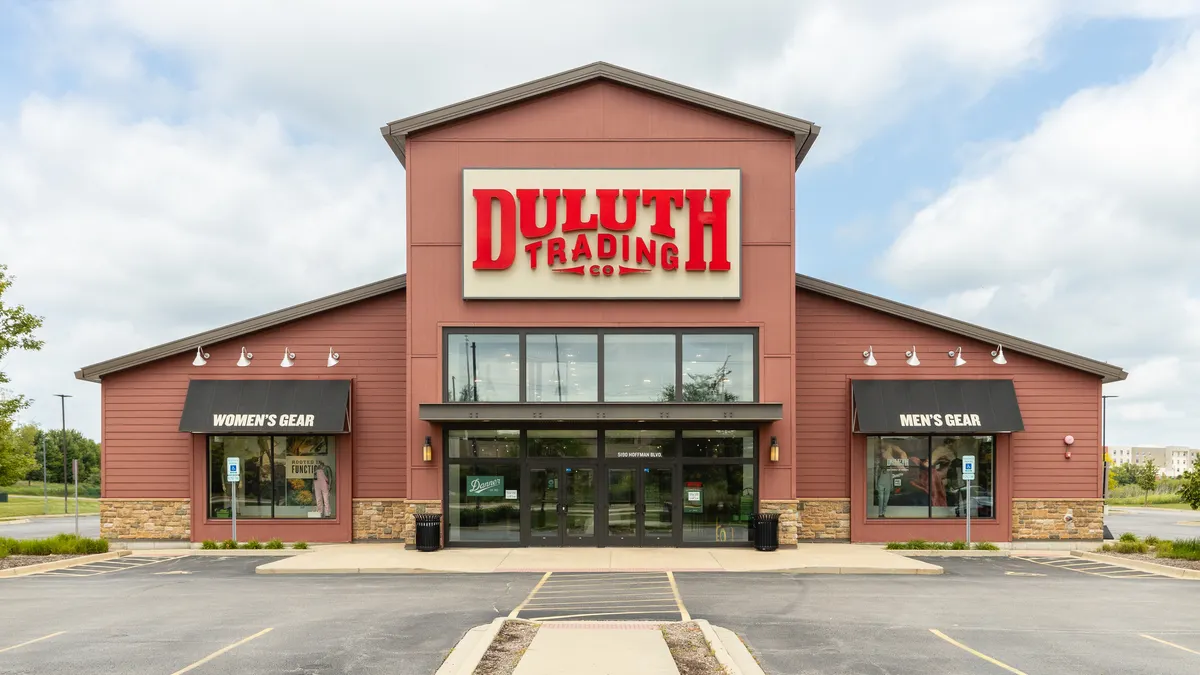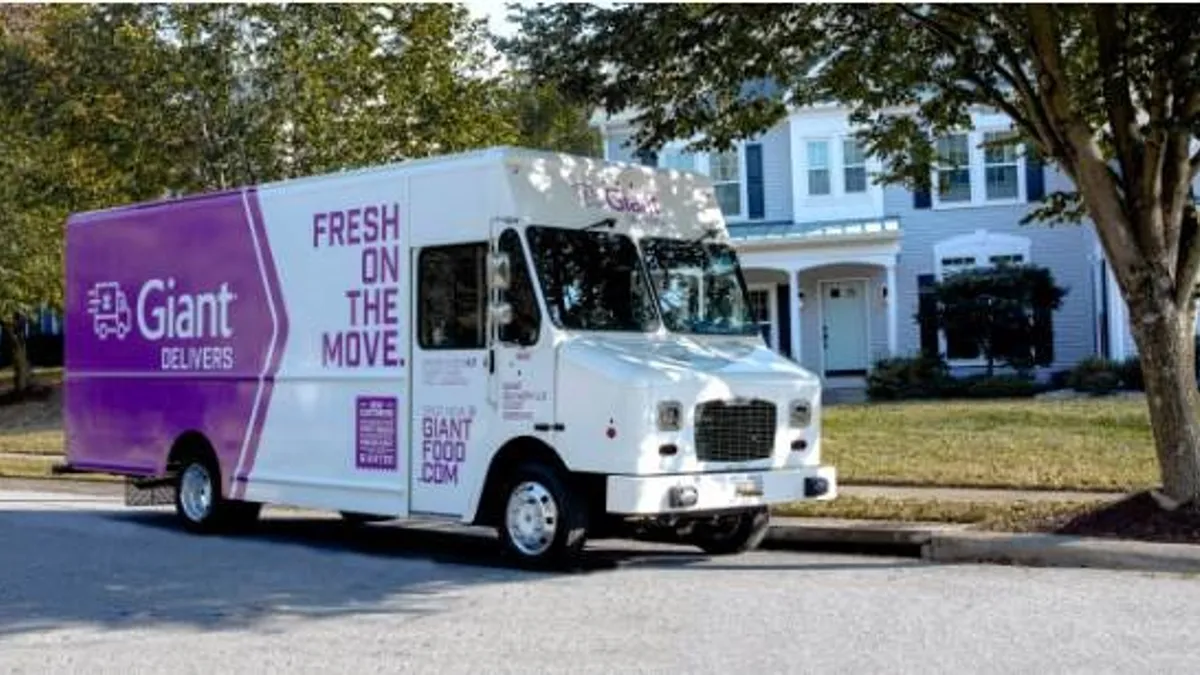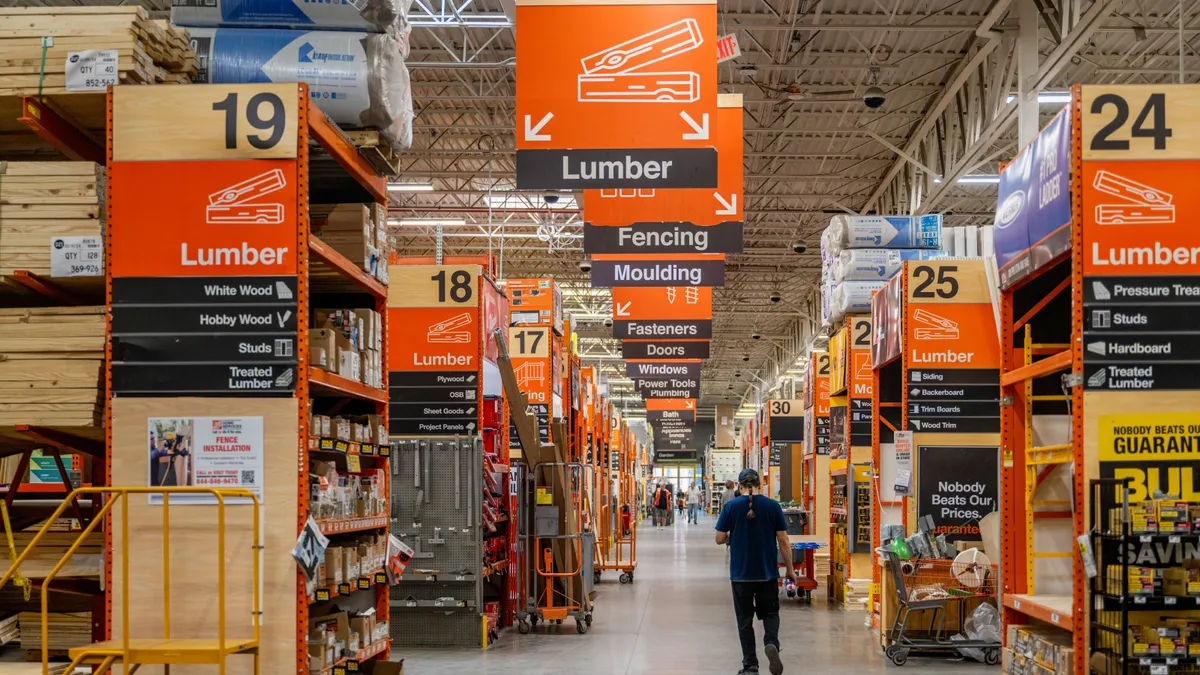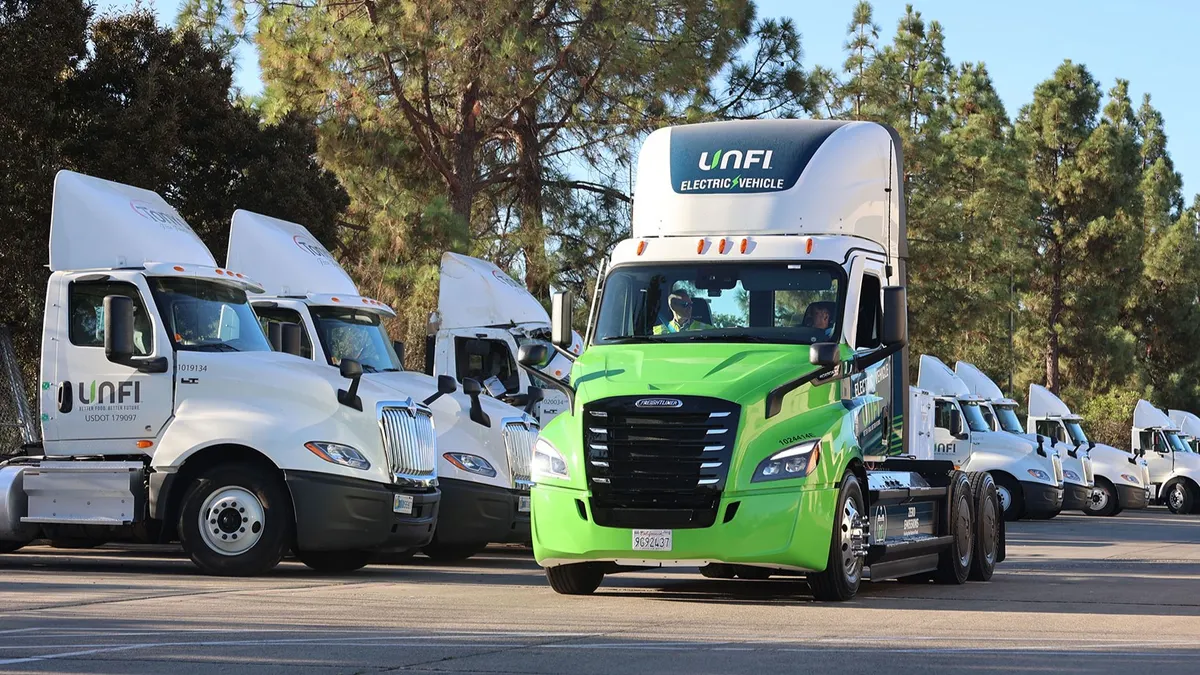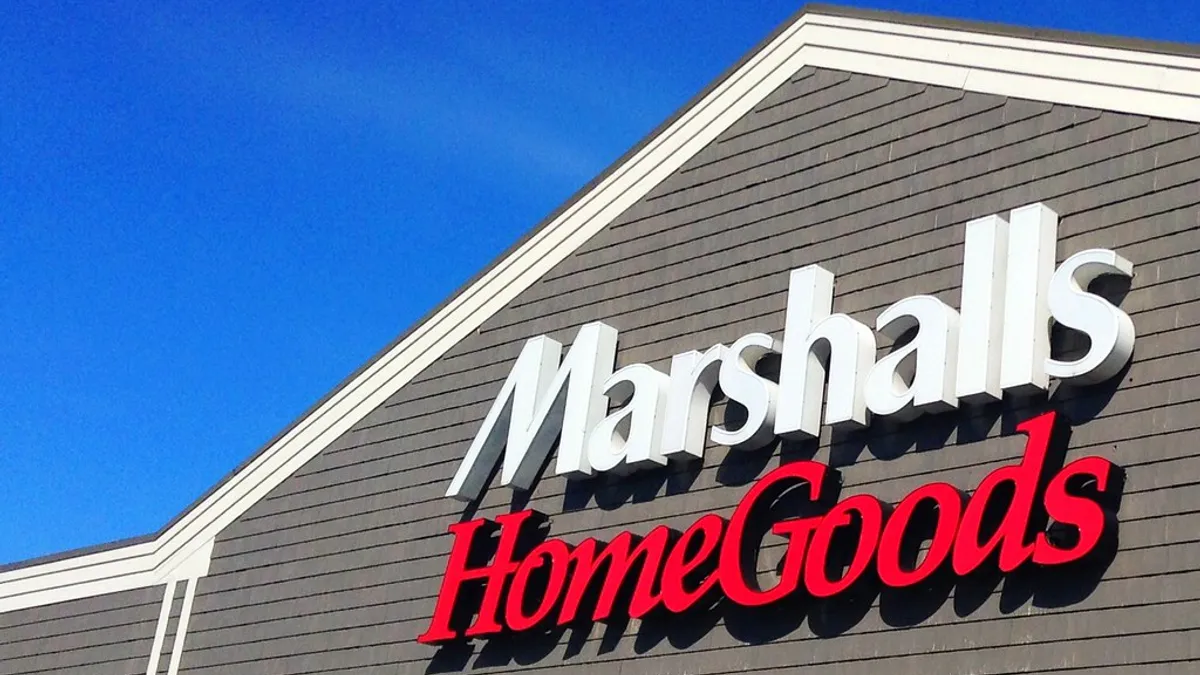The following article is part of the "30 minutes" series, where Retail Dive talks to top executives about some of retail's hottest topics. For more, check out our landing page.

Jennifer HymanCo-Founder and CEO of Rent the Runway
Tenure
2009-Present
Experience
Hyman launched apparel rental startup Rent the Runway with Jennifer Fleiss in 2009 after graduating from Harvard Business School. She has been on the board of Estée Lauder since April 2018.
Jennifer Hyman rents nearly every article of clothing in her closet, with the exception of pajamas. Her closet, as she frequently says, is in the cloud.
Nearly nine years ago, Hyman co-founded a company built on the idea that women would rather spend less to rent a designer dress for an event than shell out top dollar for something that would only be worn once. And her bet has paid off handsomely. In the years since, the sharing economy has taken off and companies like Uber, Spotify and Airbnb have rattled the business world by dramatically altering consumer expectations.
"The rental economy in 2018 runs the majority of our lives," the CEO told Retail Dive in an interview in January. "If you think about how we interact now with transportation, with travel, with entertainment, with music and now with clothing, we're so used to having an option to rent or an option to subscribe, and as a customer we can make the choice that's best for us. Sometimes I want to take an Uber and sometimes I want to drive my car that I own."
While Rent the Runway may operate in the retail space, Hyman wouldn't classify her business as a retailer. It's more like a mashup of world's largest dry cleaner, logistics operator, style consultancy, subscription service and tech company.
So when Hyman looks around, she doesn't see many direct competitors. "Most of the players in the retail space, whether they're startups or they're established players, they all have the same value proposition to the consumer, which is trying to get the consumer to buy more stuff," Hyman said. "And our value proposition is exactly the opposite of that. We're trying to get consumers to buy less stuff."
As Rent the Runway closes in on a decade in operation, scaling the business further will take a very different form than retail's traditional path of building out as many stores in as many markets as possible. In fact, physical stores are far from the priority. In a series of interviews, Hyman shared with Retail Dive her philosophy for leading the business thus far and into the future.
Scaling from two to 1,200
Growing up, Hyman said she never considered entrepreneurship as being a possible career, until she realized all it meant was having an idea and building it. She started Rent the Runway after graduating from Harvard Business School with classmate and co-founder Jennifer Fleiss (who left Rent the Runway last year to launch Code 8, an extension of Walmart's innovation arm Store No. 8).
To date, Rent the Runway has raised $210 million from a variety of investors, including a recent $20 million from Alibaba founders Jack Ma and Joe Tsai's financial firm Blue Pool Capital. According to research firm Lagniappe Labs, which first spotted the filing, that funding round valued the company at a little under $800 million. Because the company is privately held, a company spokesperson could not share sales or revenue figures, including whether the company is profitable. However, Recode has reported the company is profitable on an EBITDA basis. The spokesperson also would not comment on whether the company is aiming for an initial public offering, although Hyman has previously publicly mentioned that it is a possibility.
"I have an expectation that everyone who works here is going to have big ideas, is going to push the needle, that we're going to be able to continuously disrupt ourselves. People are going to be opinionated and that's how we're going to grow."

Jennifer Hyman
CEO and Co-Founder of Rent the Runway
Hyman's philosophy on leadership has always been to hire smart people passionate about the Rent the Runway vision, but the tactics have evolved with the company's growth from a team of two to 1,200 employees today.
"I have an expectation that everyone who works here is going to have big ideas, is going to push the needle, that we're going to be able to continuously disrupt ourselves. People are going to be opinionated and that's how we're going to grow," she said.
Executives can talk forever about what culture is, she said, but employees need to experience it in their day-to-day jobs. "They need to see in a meeting that they can debate each other, but still have kindness and positivity toward each other," she said. "They need to see that diversity of opinion is valued by nature of who gets rewarded with opportunities within the company."
But like many startups, Rent the Runway has faced criticism in the past for a cutthroat culture, one that in 2015 shed top talent including its chief operating officer, chief financial officer and chief marketing officer, among others.
Company culture is something Hyman is sensitive about, chalking it up to growing pains. "I also think [employees] need to see who an organization hires and who an organization lets go of. You say more about your company by nature of who you enabled to stay and thrive at your company," she told Retail Dive, adding that the company has an "extremely strong leadership team that's been together for years."
Stores with the efficiency of a Starbucks
These days, retailers know that their business can only scale so far by focusing only online or solely in brick-and-mortar. Rent the Runway is a part of the family of once pure-play e-tailers that is slowly building out a store presence. Today the company has five stores in major metro markets, including one in a Neiman Marcus department store. The total footprint, even years from now, won't rise dramatically, Hyman said, adding that over time she could potentially see a total of 20 to 25 Rent the Runway physical locations in the U.S.
"The movement that online businesses like Rent the Runway or Warby Parker or Bonobos have taken to offline stores has been, I think, conflated to mean that it's a huge strategy for us, whereas the majority of our sales — over 90% of our sales — are happening on mobile and online."

Jennifer Hyman
CEO and Co-Founder of Rent the Runway
"The movement that online businesses like Rent the Runway or Warby Parker or Bonobos have taken to offline stores has been, I think, conflated to mean that it's a huge strategy for us, whereas the majority of our sales — over 90% of our sales — are happening on mobile and online. [They] will continue to happen on mobile and online and we continue to see retail stores as being supplemental to the customer experience," Hyman told Retail Dive in January.
Rent the Runway is also among a growing number of companies that have tossed out traditional store metrics like sales per square foot to measure the success of physical locations. Stores instead are seen as an extension of customer service and serve to raise brand awareness.
"We're seeing our subscribers are coming into our stores, some of them a few times a week. Many of them are getting dressed for work in our store or dressed for their dates or their nights out, so they're coming in between 6 and 8 p.m. — we wanted to make the experience fun and luxurious, but give it an efficiency like a Starbucks," she said in January.
Granted, Rent the Runway stores are a bit different from traditional brick-and-mortar shops. If customers have an unlimited subscription, priced at $159 a month, they can pick out anything in the store without looking at a price tag, scan the item at a kiosk and be on their way.
To Hyman, it's a no brainer as to why so many retailers are struggling to get customers through the doors: Buying online is more convenient, efficient and fast. But that doesn't mean stores are dead — they just need to be better than the online purchase experience.
"It's having a personal experience where you could talk about what you love to wear, brands you've never tried before. One of our stylists can actually recommend, [or] have you try on 30 different outfits and help style you. And all of that data that we collect on you in the store will make your online experience better forever after that, because it will make the personalization algorithm we use for you that much more powerful."
'Our whole business is logistics'
Nearly all of Rent the Runway's 1,200 employees work with the supply chain in some way. Logistics and delivery are at the very core of the company's business model. It's where Rent the Runway innovates — and makes money.
At Recode’s Code Commerce event in Las Vegas in March, Hyman announced that at some point this year, the company will launch a logistics arm to help brands through the process of offering their clothing for rental. Several "big" retailers and brands have already signed on, although Hyman couldn't disclose their names. Nor has a date been selected for the rollout of the new logistics service, but Hyman said it's happening, "ASAP."
"We are not only giving them the ability to monetize their inventory via rental, but we're also giving them access to customer data that is critical for them growing their business and inventory data," she said.
While many of the details of the new business-to-business service aren't yet public, Hyman said it's been something that brands have been asking about for years. It's easy to see why — retailers are being flooded by a "returns tsunami" of online orders, according to recent report from Brightpearl. Globally, 25% of retailers will initiate online try-before-you-buy programs by 2019, but most are not ready for the proliferation of returns that could quadruple return costs for U.S. retailers.
"We run the largest dry cleaning facility in the world, integrated out of our warehouse, and we know more about how to restore and take care of designer garments then any other company in the world."

Jennifer Hyman
CEO and Co-Founder of Rent the Runway
So how does Rent the Runway manage the cost of shipping millions of products to and from dry cleaning warehouses? "Our whole business is logistics," Hyman said, adding she doesn't view it as a cost center.
"We've had to become the world experts in inbound logistics of receiving inventory back, inspecting it, repairing it, dry cleaning it [and] restoring it to absolutely perfect conditions. And so because of that, we're vertically integrated. We run the largest dry cleaning facility in the world, integrated out of our warehouse, and we know more about how to restore and take care of designer garments then any other company in the world," Hyman said.
That expertise didn't come easily. Over the years, the company has built a number of proprietary technology solutions and iterated on them to earn the competitive advantage it has today.
Using subscription to power retail's future
When Hyman thinks about the future of retail, iconic names from the past don't come to mind.
"When I think of retail businesses, I don't gravitate toward thinking about department stores. I think about the retail businesses that actually drive this industry, which are businesses like Amazon or Walmart or Zara or H&M," she said. "Those are the four retail businesses that drive consumption. And what those businesses have proven over the last few decades globally, is that people value quantity over quality and they value low price."
While a Rent the Runway subscription isn't cheap for many Americans, it does offer value on designer products as well as constant newness, which checks those boxes at least for wealthier, professional women.
While Hyman couldn't reveal specific numbers on how many active subscribers the company has, she said that roughly 9 million women are Rent the Runway members. The demographics vary widely — from high school students looking for a more cost effective way to go to homecoming to pregnant women who may not want to be stuck with maternity clothing they may never wear again.
"Entrepreneurship is about failing quickly and the humility to learn."

Jennifer Hyman
CEO and Co-Founder of Rent the Runway
In the beginning, the assortment was mostly professional and formalwear, but Hyman said that today everyday clothing — which is included in its unlimited subscription plan that launched two years ago — makes up the majority of the merchandise mix and accounts for most of the revenue. And it even includes items less frequently used like beach bags and ski jackets.
"[Unlimited] customers are using [Rent the Runway] 150 days a year. So if you think about what other brands you transact with 150 days a year, the list is very, very small," she said. "It could be brands like Starbucks or Spotify or Netflix or Amazon Prime, but that's really it. So it's completely game changing in terms of how they're using this, they're using this as a true substitution for shopping."
As Rent the Runway continues to scale into retail's future, Hyman said testing and quickly learning is the key for any startup to remain a disruptor.
"The way you build an entrepreneurial culture is you give a team the power to innovate. And a lot of the choices that the team needs are not necessarily going to be the right choices initially, but if they're given the room to learn and grow and iterate those choices, you eventually lead to very, very successful ideas," she said. "So really, entrepreneurship is about failing quickly and the humility to learn."
UPDATE: The story has been updated to include additional information from the company to clarify current business operations.







